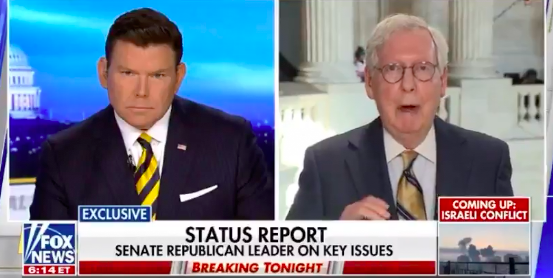Don't Sleep on Mitch McConnell as a Shame Pioneer
- Oops!Something went wrong.Please try again later.
- Oops!Something went wrong.Please try again later.

"You have these people in society called 'norm entrepreneurs,'" Jennifer Jacquet, a New York University professor, told me when we discussed the social function of shame. "The leadership sets the tone for the country." It seems fair to say that there are also Shame Pioneers—or, perhaps, pioneers in shamelessness. Donald Trump gets a lot of credit in this regard, and for good reason, but one thing we spotlighted even back in that 2018 article was Senate Republican leader Mitch McConnell's role in settling new territory on this particular continent.
McConnell used to stand out primarily as an innovator with regard to procedural shamelessness, using the Senate's anti-democratic structures to infringe on then-President Barack Obama's constitutional prerogative to appoint federal judges, then using the ascension of Obama's Republican successor to stuff the judiciary full of Federalist Society types who will reliably push the conservative movement's agenda from the bench. But he's also a shameless one with regard to language, not least when he stole a Supreme Court seat by first denying Merrick Garland a hearing based on a creative extension of what he started calling "The Biden Rule." And McConnell has similarly adopted the now-core conservative rhetorical tactic of appropriating terms with a particular meaning and purpose and wielding them against the cause they exist—or existed—to support.
Trump tried this briefly with "The Big Lie," though it's been a far less effective push than his redefinition of "Fake News." This is impulse at work among the now limitless cast of Republicans yelling about "wokeness." And McConnell was back in action in this regard on Thursday while discussing S.1, the Senate companion to the House-passed H.R. 1, the For the People Act.
McConnell: It’s a solution in search of a problem.. Nobody’s votes are being suppressed anywhere across America in any of the states... pic.twitter.com/mdyDMAK0oj
— Acyn (@Acyn) May 12, 2021
"It's a solution in search of a problem."
This perfectly describes the ever-expanding list of restrictive voter laws passed or under consideration in Republican state legislatures across the country. Voter fraud is, statistically, an almost non-existent problem. It is so vanishingly rare that it is just a complete waste of time to obsess over it the way the American political world has since 2013, when John Roberts led the Supreme Court in gutting the Voting Rights Act in Shelby County v. Holder. That opened the country up to all the anti-democratic tomfoolery that's gone down since. Even if it remains somewhat inconclusive as to whether these Republican voter-suppression policies have been effective enough in targeting Democratic voters to make the difference—and some of the post-2020 election suppression measures could well backfire on Republicans—the intent is clear. That the 2020 contest had large turnout does not somehow mean Republican legislatures are not attempting to suppress the vote. Because again, these measures to supposedly combat voter fraud are the hot thing at a time when voter fraud is not a real problem. So there's got to be another reason.
But that wasn't all from McConnell, who called H.R.1/S.1 "a partisan takeover." Previously, he's called it a "power grab." Again, this is rich—in shameless moxy—from the guy who engineered a nakedly partisan push to take over the courts. It's also something because voter-suppression tactics, along with extreme partisan gerrymandering and a Wild West campaign finance and lobbying system that privileges the richest and snuffs out the voices of so many others, are themselves attempts at power-grabs and takeovers. And these are all problems that H.R.1/S.1 attempt to deal with, however imperfectly. We can quibble on the details, but trying to draw fair district maps and get the big, secret money out of politics is not a Power Grab, unless you represent the people who are currently hoarding the power. It's more, better democracy. McConnell is hoping that his audience will never actually look at the proposals—which poll well with Republican voters—and that he can prime people to oppose them by reframing them in an almost psychedelically false way. Based on his track record, who would bet against him?
Join Esquire Select for unlimited access + a subscription to the magazine.
You Might Also Like
